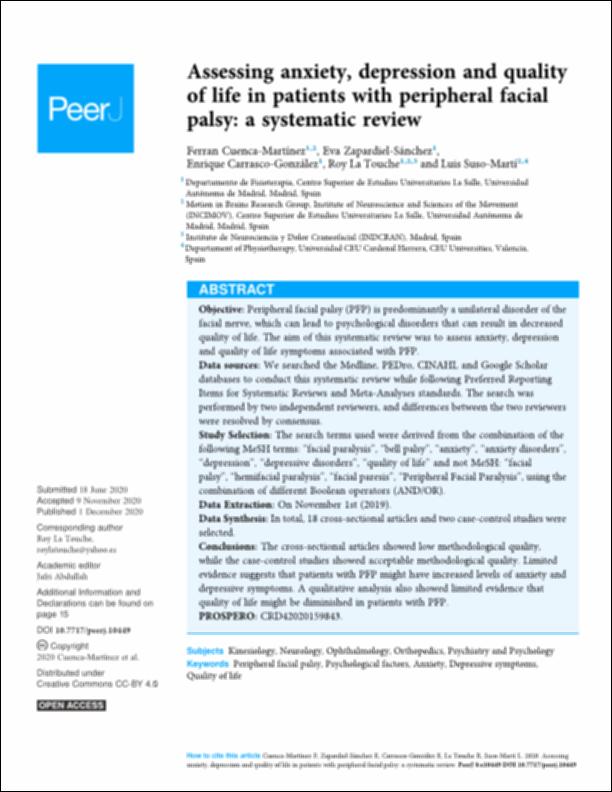Please use this identifier to cite or link to this item:
http://hdl.handle.net/10637/12735Assessing anxiety, depression and quality of life in patients with peripheral facial palsy : a systematic review
| Title: | Assessing anxiety, depression and quality of life in patients with peripheral facial palsy : a systematic review |
| Authors : | Cuenca Martínez, Ferran Zapardiel Sánchez, Eva Carrasco González, Enrique La Touche Arbizu, Roy Suso Martí, Luis |
| Keywords: | Facial paralysis - Patients - Quality of life.; Ansiedad - Pacientes - Aspectos psicológicos.; Depression, Mental - PatientsxPsychological aspects.; Avian influenza.; Parálisis facial - Pacientes - Calidad de vida.; Anxiety - Patients - Psychological aspects.; Gripe en las aves.; Depresión mental - Pacientes - Aspectos psicológicos. |
| Publisher: | PeerJ, Inc. |
| Citation: | Cuenca-Martínez, F., Zapardiel-Sánchez, E., Carrasco-González, E., La Touche, R. & Suso-Martí, L. (2020). Assessing anxiety, depression and quality of life in patients with peripheral facial palsy: a systematic review. PeerJ, vol. 8, art. e10449 (01 dec.). DOI: https://doi.org/10.7717/peerj.10449 |
| Abstract: | Objective: Peripheral facial palsy (PFP) is predominantly a unilateral disorder of the facial nerve, which can lead to psychological disorders that can result in decreased quality of life. The aim of this systematic review was to assess anxiety, depression and quality of life symptoms associated with PFP. Data sources: We searched the Medline, PEDro, CINAHL and Google Scholar databases to conduct this systematic review while following Preferred Reporting Items for Systematic Reviews and Meta-Analyses standards. The search was performed by two independent reviewers, and differences between the two reviewers were resolved by consensus. Study Selection: The search terms used were derived from the combination of the following MeSH terms: “facial paralysis”, “bell palsy”, “anxiety”, “anxiety disorders”, “depression”, “depressive disorders”, “quality of life” and not MeSH: “facial palsy”, “hemifacial paralysis”, “facial paresis”, “Peripheral Facial Paralysis”, using the combination of different Boolean operators (AND/OR). Data Extraction: On November 1st (2019). Data Synthesis: In total, 18 cross-sectional articles and two case-control studies were selected. Conclusions: The cross-sectional articles showed low methodological quality, while the case-control studies showed acceptable methodological quality. Limited evidence suggests that patients with PFP might have increased levels of anxiety and depressive symptoms. A qualitative analysis also showed limited evidence that quality of life might be diminished in patients with PFP. |
| Description: | Este artículo se encuentra disponible en la siguiente URL: https://peerj.com/articles/10449/ |
| URI: | http://hdl.handle.net/10637/12735 |
| Rights : | http://creativecommons.org/licenses/by/4.0/deed.es |
| ISSN: | 2167-8359 (Electrónico). |
| Issue Date: | 1-Dec-2020 |
| Center : | Universidad Cardenal Herrera-CEU |
| Appears in Collections: | Dpto. Enfermería y Fisioterapia |
Items in DSpace are protected by copyright, with all rights reserved, unless otherwise indicated.


